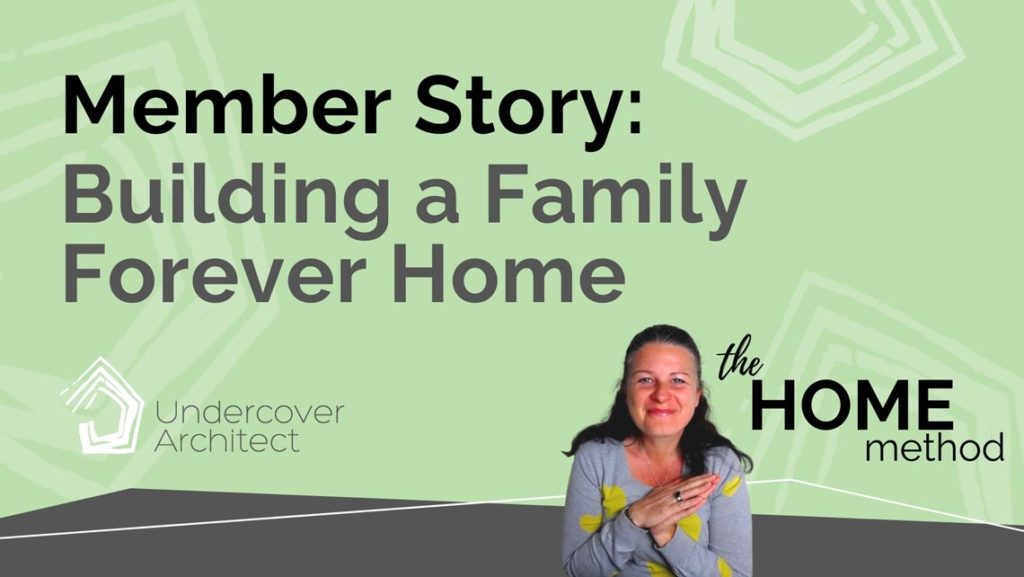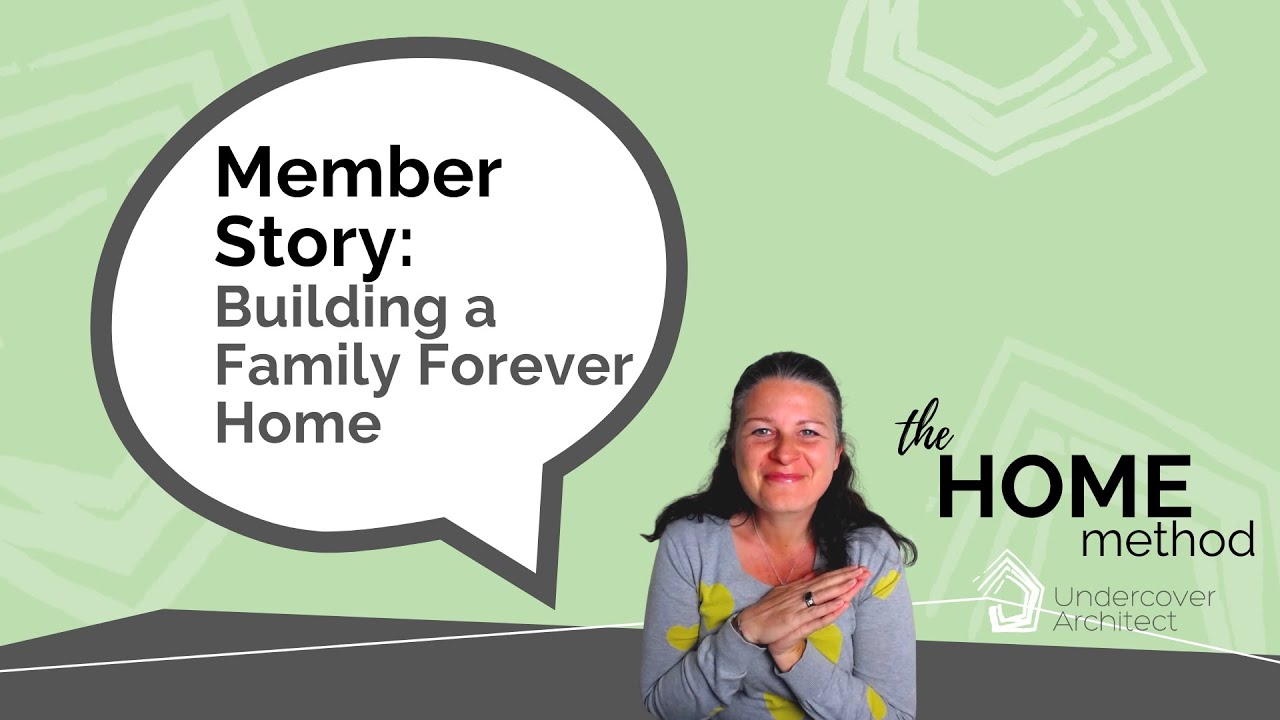
Ellen is building a family forever home, together with her husband and children, in Ballarat, Victoria.
Listen as Ellen shares more about her new home journey, and how she’s prepared herself to get it right.
Ellen is a member of the HOME Method and Interior Design 101.
My name is Ellen Jackson. I am a workplace and coaching psychologist. I am based in Ballarat, in Victoria, which is in the southeastern part of Australia.
What concerns did you have before you started?
Yeah, look, I think our biggest concern was really where to start, you know, having had no experience. It was an overwhelming prospect to know even how to begin designing a house or deciding what it was we needed, you know. There are so many different things to consider.
And I had actually listened to Amelia’s podcast, Get It Right with the Undercover Architect, which was enormously helpful in just giving me some tips and guidance as to where to start and I was a huge fan of her podcast. I can’t remember, maybe, I probably started listening to the podcast around the time that I met her, I can’t remember. But just for, you know, really getting a sense of understanding who she is, how she works, why she does what she does.
One of the things I loved about it was that she’s trying to make what can feel like a bit of an untouchable type subject, you know. Architecture has that kind of, you know, not sure what the word is. It’s like a sense to it, that it’s, you know, it’s expensive, and it’s, you know, for particular types of projects, you know, really high-level fancy projects.
So, she really gave me the confidence to understand or, and the knowledge to understand, that it is just about making the home that you’re designing functional and liveable, and fit the lifestyle of the family, in our case.
So, and the fact that she’s taken all of that online into a digital forum. So you know, online programs, her podcast, support and services for people through a digital platform, which is a lot of what I do as well, as a psychologist. So we kind of had that in common.
And, you know, I love that, you know, that she was doing it and why she was doing it. Her message about wanting to help, particularly women, to have the confidence and enough knowledge to be able to navigate all of that process – from the design, through to working with the builder, all the decision making, and having the kind of knowledge and skills confidence to be able to do that effectively. I think it’s just, it’s a fantastic resource for people.
What made you decide to join the Undercover Architect online courses?
For the first one, I listened to the podcast series on how to manage your build, or how to work with a builder, and found that enormously helpful. Because, I had no idea where to start or what that process looked like. But to then be able to tap into checklists, and guides and further detail, to have all of that. You know, it’s one thing to be able to listen to it, but to then have it all documented for you as well.
So they were all of the added benefits that the online program provided, was having all of that to hand so that it’s there when I get to that stage. And I can refer back and actually use all of the tools and that detail that’s inside the program.
With the Interior Design 101 program, similarly, I think I was really overwhelmed with where to start when it came to making decisions about all of the fixtures and fittings for our home.
And I listened to the podcast series that Amelia ran on that. And then for the same reason, wanting to just have access to … so she provides videos and transcripts so you’ve got all of that detail to hand to revisit the parts that you need when you need it.
But there’s also, you know, links to products. There’s further detail. There’s checklists. There’s bonus resources, you know. There’s content that she wasn’t able to cover in the podcast, because you can only have an episode for so long. So there’s kind of extended interviews and other other really useful tips and tools inside the course that have been enormously helpful to me.
What have you learned from the Undercover Architect courses?
I think one of the things that has been really useful to me was thinking through the importance of making all your design decisions very early on in the piece. I don’t think that was something that I fully appreciated until I both listened to the podcast episodes and then enrolled in the courses.
Being able to think through, you know, if we’re going to have a vanity, that we want it to kind of hang from the wall for example. Knowing that we need to know that ahead of time before decisions are made. About how to, you know, when to get a plumber and how a build is going to build all of that.
So, yes, and to the point where now, even though we’re still in the design phase, we’re starting to look at lighting design and window finishing, and what we’re going to use to be able to make, and flooring and being able to make all of those decisions very, very early on in the piece. So that we’re not having to change things once we’re on site and we’ve got the builder there, that’s just a recipe for stress and cost, which we’re going to try and avoid.
When you are starting and you’ve never done something like this before, you don’t even know what you don’t know. So to be able to gather as much information in a really kind of accessible, engaging, informative way from a range of experts who you feel like you can trust, has been, you know, really, really beneficial to kind of open my eyes to what the next steps and to feel confident and feel like I have some handle on what I’m doing.
How have you benefited from doing Undercover Architect courses?
But I think what it has done, it has given me that sense of, Okay, I need to make, you know, those decisions about design choices early on.
I know one of the things that Amelia talks about, is the importance of gathering your team which is something I hadn’t really thought about as well. So it’s not just a builder, but you’ve got your builder, you’ve got architects, you’ve got engineers. Then if you’re using people like lighting designers, landscape design, all of that.
So really the usefulness of knowing that I need to kind of gather that set of resources early on in the piece, and to start making contact and having conversations with these people. And it’s given me the confidence to know that I can do that with, you know, kind of the basic drawings as a starting point.
And people have been really helpful and receptive to that. I think, listening to the experts that Amelia works with, both through podcasts, through her programs, they all emphasise the importance of getting all of this stuff right. Right at the outset through the design phase.
And so they’re kind of excited when you actually go to them and say, look, we’re really just feeling this out. It’s very early days, but I’d love your advice, or your input or your thoughts on, you know, how we should lay out the garden or what we need to do with regard to lighting.
And that, you know, again, once you have those conversations, that reinforces your kind of confidence that okay, I’m on the right track, I know what I’m doing.
What do you enjoy most about the Undercover Architect courses?
I know it’s certainly given me confidence. It’s giving me tools. It’s giving me networks of people to call upon for assistance. It is certainly the intention, that by doing all of this upfront, and by following all the guidance that Amelia gives, that we will reduce our stress, that we will reduce the risk of having to make changes on site as we go. And that will increase the likelihood that we’ll be able to stay within our budget.
You know, that’s a really big important part. I think that’s probably one of the things that people are most fearful about. It’s because you hear these horror stories about building projects blowing, you know, out, and well surpassing the initial budget, and how stressful that can be.
So having all of this ahead of time, right up front, is really, really, you know, it’s giving me the confidence that yes, we can actually do this. We can do it, you know, with as little stress as possible. Within our budget, which is really important.
Yeah, just having the confidence to avoid the things that are most likely to stress you out or that you’re worried are going to stress you out. Because we don’t have a whole lot of time to commit to doing this, you know. I run my business, and we have a busy family. And, yeah, we want to be able to do it with as calm and organised manner as we can.
And the experts that she works with and talks to, you know, they’re great. They respond really well to her and her style. And so it just becomes, you know, it feels like you’re actively engaged in those conversations. So you know, there’s so much content in there.
And I think, yes, so you can kind of go through it once to get an overview, and an idea of what to expect. And then as you’re actually getting to those different stages of the building project itself or getting to the point of having to make decisions about specific things, you can go back and then actually start to really use some of the tools, the checklists, the guides, you know.
One of the really useful things for me in ‘Manage your Build’ (which is inside the HOME Method), was just having a list of all of the types of drawings that you should, that you’d need in order to really work well. You know, get costing right to get the plans right with the builder, and then work really well with the builder so that the decisions are all kind of there and made up front.
So I don’t think I would have had any idea where to start or how to even access that information if it wasn’t all pulled together in one place via the program.
And for others who are considering joining Undercover Architect’s courses?
For me, it’s all been absolutely worth every cent that we have spent in order to feel like we have control and reduce some of that fear and anxiety.
So really, you know, giving me confidence to know even what decisions to make and what questions to ask of other people.
I wouldn’t hesitate in recommending them just because I don’t know where else you would find that level of information, presented as clearly and as usefully as it is, anywhere else.

 With over 30 years industry experience, Amelia Lee founded Undercover Architect in 2014 as an award-winning online resource to help and teach you how to get it right when designing, building or renovating your home. You are the key to unlocking what’s possible for your home. Undercover Architect is your secret ally
With over 30 years industry experience, Amelia Lee founded Undercover Architect in 2014 as an award-winning online resource to help and teach you how to get it right when designing, building or renovating your home. You are the key to unlocking what’s possible for your home. Undercover Architect is your secret ally
Leave a Reply